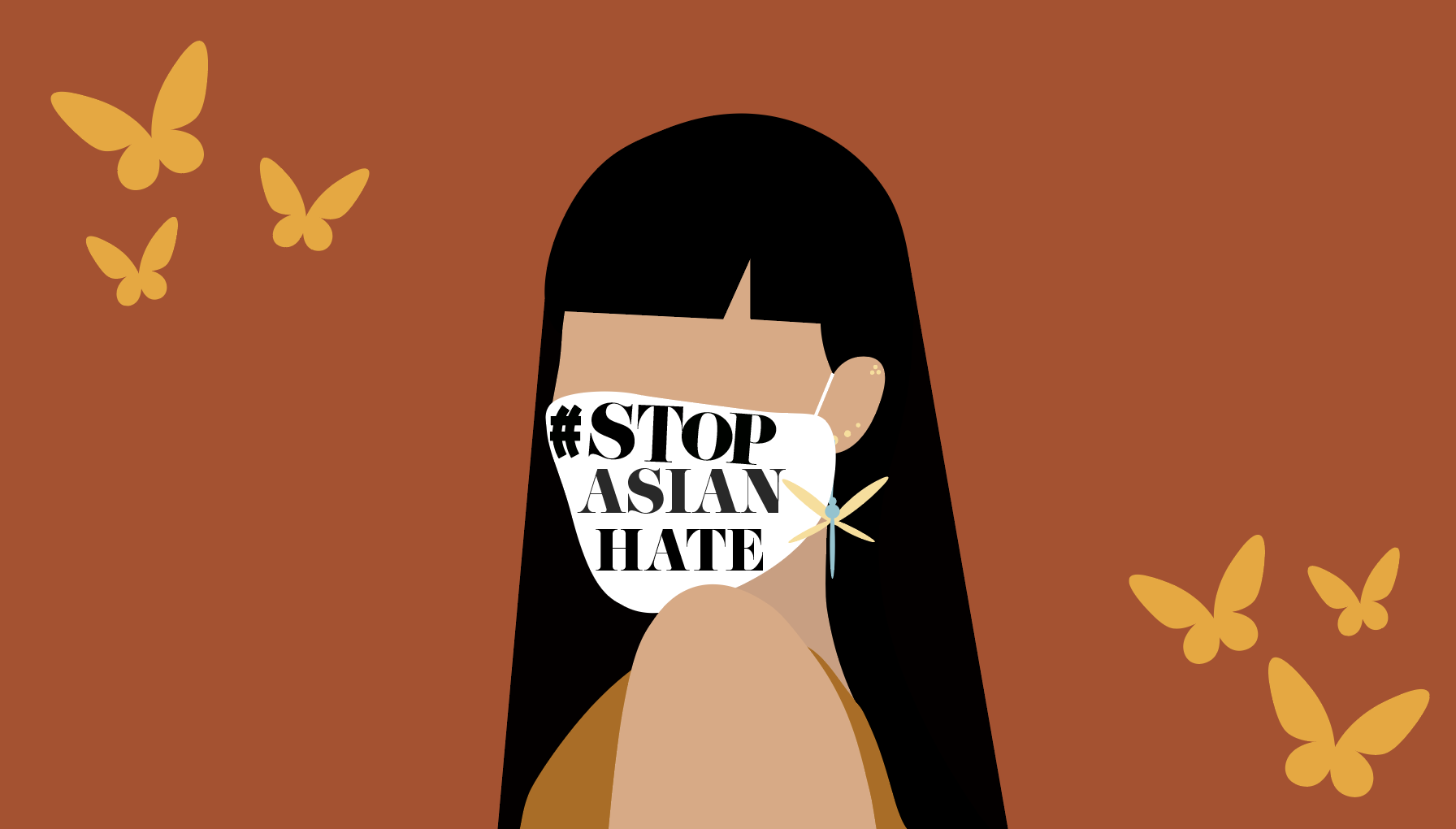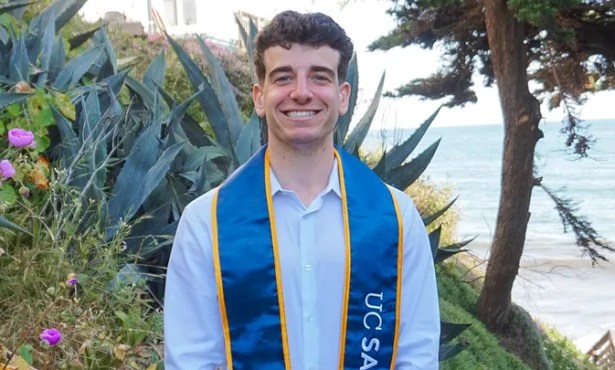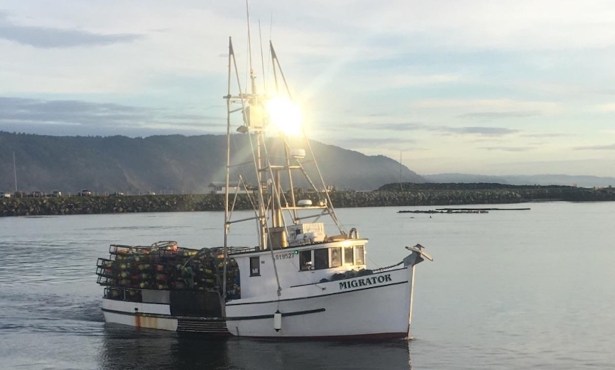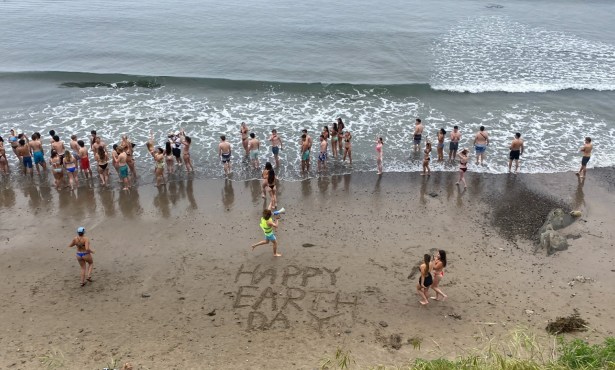Santa Barbara’s Asian-American Community Reacts to Atlanta Shootings
Nine Lived Experiences from Nine Local Residents

Here are the facts:
Last March, as a wave of pandemic fear and anxiety broke over the United States, it brought with it a surge of hate crimes and incidents targeting Asian Americans. While hate crimes overall dropped 7 percent between 2019 and 2020, anti-Asian attacks jumped by 149 percent.
Stop AAPI Hate, a San Francisco-based nonprofit founded last year, documented 3,800 incidents across the country. Most of them targeted women. (AAPI stands for Asian American and Pacific Islander.)
A report published by the Center for the Study of Hate and Extremism earlier this month revealed that Google searches for racist terms like “China virus” and “Kung flu” spiked in 2020.
Former President Donald Trump used the phrases multiple times that year, including as recently as March 16, 2021, when he referred to the “China virus” during a Fox News interview. That same evening, eight people were shot and killed in Atlanta area spas, six of whom were women of Asian descent.
The police spokesperson who sparked national outrage after he told reporters the suspect was simply having a “bad day,” and that his murder spree was not racially motivated, had recently promoted a T-shirt on Facebook describing the coronavirus as “IMPORTED FROM CHY-NA.”
Now, here are the voices of nine members of Santa Barbara’s AAPI community, who were asked to share their reactions to the Atlanta shootings and as well as their personal experiences with hate and discrimination. Some of their responses have been edited for length and clarity:
Get the top stories in your inbox by signing up for our daily newsletter, Indy Today.
Sabrina Hong
I’m a first generation Korean American who immigrated to Los Angeles at a young age with my immediate family and, before moving to Santa Barbara, spent most of my life in L.A. and the Bay Area. In the last year, the fear I’ve felt for the safety and well-being of my friends and family, in particular my mother, has been constant. When the news of the shooting in Atlanta broke last week, all the fear I had been holding onto turned into rage and a deep sadness for the communities, friends, and families of those who lost their lives.
Many of us instinctively react to tragedies like the one that killed eight people in Atlanta, but those tragedies are born out of the normalization of racism and the upholding of white supremacy. The same people I heard in the last week who have been outraged by the deaths in Atlanta were the same people who stood idly by while men made comments about my “oriental beauty” or “exotic features.”
How many people who felt the events in Atlanta were terrible also remained silent when their colleagues and neighbors referred to COVID as the “China virus”? How many people who posted to social media about stopping Asian hate lose patience toward a working person using broken English? How many people think about Asian Americans like an East Asian monolith? How many still buy into the model-minority myth?
For those who believe this is a problem that doesn’t involve them or our community, it does. Stop asking me “what I am” or “where I’m really from.” Stop telling me I’m attractive “for an Asian person.” Speak up when the woman at the grocery store says to wipe down something because “that oriental woman over there touched it.” Don’t just shake your head and keep walking when someone catcalls me and proceeds to mockingly bow in the street. Say something when someone threatens violence against an Asian restaurant owner (and Asian patrons who stood up for them) for asking them to wear a mask.
These incidents have all happened within the last year of me living in Santa Barbara. The stares and looks of disappointment from others don’t help anyone, but speaking up, learning about common microaggressions, having vulnerable conversations with your friends and family about normalized racism, and holding space for your Asian-American friends does. We all want to be a part of a community that we feel has our back, and that means being active and responsive against hate and discrimination when it happens.
Hannah Yoo
The media portrayed it as just another shooting, but deep down I knew it was an act of domestic terrorism. It made me really reflect on the anger and frustration that I have been silently feeling this past year. There were some moments when I felt a little sense of optimism ― when I saw the solidarity shared by BIPOC, AAPI, and allies ― but tragic events keep happening, and it gets hard to stay hopeful and positive.
As an Asian-American woman, I have experienced many microaggressions from outside of my circle as well as within. There are a lot of layers to living with this “model minority” stereotype. I have had experiences where my heritage is erased, and I am told by friends that they forget that I am Asian. It makes me wonder if I’ve assimilated so much that I am now granted access to this circle of “whiteness,” which I never asked for. It makes me wonder if it’s my fault for not representing my culture enough.
Other times, I hear that someone of the opposite gender is attracted to me because I am a “small Asian woman.” It makes me feel weak and inferior and reduces me to a fetishized version of what people perceive all Asian women should be. It completely erases who I am as a person. I have endured that stereotype as far back as middle school. I have tried to push back on it all of my life, but it has been perpetuated for so long and it is so ingrained in people’s minds that they feel they can say it with no repercussions.
Anonymous
Even before the Atlanta shooting, anti-Asian violence was on the rise, with Asian elders being the targeted. I was heartbroken to see our Asian grandmas and grandpas physically attacked, taking blows to the head. However, most of the media was not covering these atrocities (most of the incidents were recorded by small organizations and individuals), so I gaslighted myself and chose to stay silent because I felt conflicted about speaking up about anti-Asian violence during Black History Month.
Then when police excused Robert Aaron Long’s murderous behavior on having a “bad day,” that put me in disbelief. My anger only grew as I started seeing white people in the media explaining that fetishization and exoticization of Asian women is not racist because they are “appreciating” the “beauty” of a group of people. Or how Asian people are not considered people of color and not vulnerable because they are one of the “highest-earning” minority groups. Or how Asian people don’t “reaallyyy” experience racism because all of the stereotypes about them are positive (i.e., being good at math). I began to realize that part of being Asian American means that you grow up expecting to be thankful for certain privileges Black/Brown/Indigenous communities don’t have, but knowing that your lived experiences of microaggressions and discriminations will never be validated.
I have enough personal stories to fill a book, but I will narrow it down to one incident that happened within the past year. I was looking for job opportunities post-graduation (before the pandemic) and was interviewing with multiple companies. One of the interviewers said that my eyes were exotic and asked if he could guess what kind of Asian I was. He asked if I was Filipina. I told him I was Korean. He then proceeded to tell me Filipina girls are so beautiful, and he loved their food and has a ton of Filipino friends. After the interview, he texted my personal number and said I got the position, and he was excited to meet me in person. I declined the offer.
Cara Austine
When I was hiking in Goleta, a white Caucasian male in his sixties to seventies told me to “go back to where you come from.” I told him to get away from me, but he kept turning around and aggressively getting into my face. I pulled out my mace and threatened to use it if he didn’t step back and leave me alone. Why do I have to beg to be left alone?
This is the kind of terror that Asian women have to face on a daily basis. We don’t want the red carpet; we just want to exist without being attacked for how we look.
Anonymous
I am Chinese American, born, bred, and educated in Atlanta. My family and the community that raised me still live there. In the aftermath of the shootings, the most potent thing I am struggling with is the response from the police spokesman there, who said the shooter was just having a “bad day.” For me, I can’t separate the normalization of murdering members of a minority group from a tragedy my own family experienced. I’ve never had the courage to talk openly about it before.
My parents got into a bad car accident on the outskirts of Atlanta several years ago ― their minivan was hit by a semi. My grandma was killed, and my dad was taken to the hospital unconscious. My mom’s broken English frustrated the cops. They took a much more comprehensive statement from the lawyer of the semi company than from her. While we were grieving the loss of my grandmother, my 75-year-old mother was charged with vehicular manslaughter. She had to turn herself in and spend a night in jail to clear the warrant for her arrest.
As my family was trying to figure out the legal system and hire a criminal defense lawyer, we weren’t thinking about gathering evidence or requesting an accident investigation. By the time we started gathering information, there was nothing left. There were gaping holes in the police records ― no statement from my mother, no car, very few photos, minimal to no investigation of the crash. The lack of evidence was so bad that even our attorney was shocked. The feelings of injustice were so deep and painful. I wonder constantly if the cops failed to do their due diligence because they thought that the life of a elderly immigrant family wasn’t worth the bother of a proper investigation.
When the shootings in Atlanta happened, and the cop said that the shooter was having “a bad day,” it felt like I lost my grandma again. It felt like my mom was going to jail again. It felt like someone was saying to me that our lives aren’t worth the effort of protecting. It has been a week since the shootings, and I am still struggling to feel safe. I know that I am safe ― people from the Santa Barbara community have been incredibly warm, loving, and supportive. But I am still struggling to feel safe, and I realize that sharing my story is a part of what is necessary to feel that way again.
Brigette Park
The increase in violence that we have faced as a community has been constantly at the back of my mind. It has made me fear for the safety of my family, especially my parents who are aging and not as physically capable of defending themselves.
Beyond these personal fears, the hate crime that occurred in Atlanta has reminded me that there are so many harmful stereotypes and misconceptions about the AAPI community ― stereotypes and misconceptions that more than likely had a role in what happened in Atlanta, and I believe it is imperative to address them and to educate our collective communities on how these are not our truths.
We are not all Chinese. East Asians are not the only Asians. Asian women are not just exotic objects of your sexual fantasies. Asian men are not weaker than men of other races and ethnicities. We are not all rich, upper-class citizens. We are not the reason why this pandemic occurred nor why it proliferated to the point where the U.S. has surpassed half a million deaths.
Nao Otomo
“I wonder if I would be targeted (for violence) if people find out that I’m half Japanese?” That’s been in back of my mind since my daughter Celina said it. The fear is spreading among Asian communities in this country, and it eventually made it to our dinner table, too. I try to box away my anxieties and fears that arise after watching news reports of violence against Asians. How can I combat those feelings, and what can I teach my daughter?
It’s truly tragic what happened in Atlanta, but I can’t let my fear control my days. I might be naive to think this way, but I’m truly blessed with incredible people I’ve met throughout my life, and I feel so fortunate to be living in a supportive community like Santa Barbara. I have to hold on to good in time like this; every day I am appreciative of random acts of kindness by strangers.
Thank you to the kid on skateboard who offered me help when I was packing up my art booth at the beach show. Thank you for the lovely couple who decided to purchase my painting. Thank you to the young man who shared his avocado sandwich with me. I gotta stand up tall and keep on going with a smile behind my mask, knowing there are far more good people than bad ones out there. I remind Celina how important it is to be kind and respectful to others, to recognize when someone is nice to her, and not to take anything for granted.
Kellie Lee
I have lived in Santa Barbara since late 2013 and consider this community home. I knew from day one that I was definitely a minority here ― very few people around town looked like me. I would get stopped by summer tourists asking for directions, Super Cuca’s knew exactly who I was when I came in every Tuesday night at 9:45 p.m. for post-class dinner, and I can never get all the ingredients I need for some recipes. But the community embraced me, and I’ve been fortunate to build a beautiful life here.
It wasn’t until COVID hit that the very community who embraced me began to look at me differently. While I haven’t been subject to some of the physical violence taking part in other cities, I quickly noticed some grocery shoppers doing a double take at me, then step the opposite direction. Nothing had changed, just racist rhetoric by the former president that emboldened people to look at me differently. I shouldn’t have to grocery shop in fear for my safety or question if I should walk alone. I should feel safe at home.
Karrmen Tshing
I always felt lucky: lucky I didn’t get bullied, lucky I didn’t get called racial slurs, lucky I didn’t get harassed, lucky the extent of my personal and direct experience of racism is the (white) male gaze, lucky this town doesn’t seem to have a lot racist extremists, lucky I didn’t have it as bad as the stories I hear.
The problem is, why do I need to feel like the “lucky one” for not experiencing what others in my community are going through?
The real question is, why should anyone experience these traumas simply because of the color of their skin, the food they eat, the native tongue they speak, their culture, their heritage? Why are they being bullied, harassed, targeted, and killed simply because they are living?
I shouldn’t and no longer feel “lucky” when I think that “I don’t have it as bad as my fellow AAPI communities” because the reality is, no one deserves to have these hate crimes happen to them. Whether it is done in a joking manner with lightheartedness from the offender or a mass shooting that took eight lives, it all stems from the same source that manifest into various actions. The concept of the “lucky few” also stems from that same source: racism.
The Atlanta hate crime shooting is just the most recent domino in a chain of violent attacks on Asians across America. What is the community here, including the press, going to do about it and stop it from happening in Santa Barbara?
Allison Yin
It has taken me days to process what exactly I’ve been feeling since the murders in Georgia. Heartbreak, rage, and fear are only a few range of emotions I’ve experienced recently. It’s been difficult to put into words, because the issue is much more complex than what we see on the surface.
Since childhood, I have been the target of racist remarks. Simply put, it is exhausting to walk through life as a person of color. And if it’s exhausting for us now, I can only imagine what our elders have had to endure. They paved the way for us here, which is why it’s devastating to see they are being attacked at an alarming rate. It’s infuriating that there is little to no media coverage on the violence against our community. I barely just learned that a father and his two young sons were stabbed in March of 2020 because the attacker believed they were spreading Covid. Trump’s “China virus” and “kung flu” rhetoric has reignited xenophobia matching the days of the Chinese Exclusion Act of 1882.
And now some white man had a “bad day”, at the expense of 8 people’s lives – including 6 Asian women. The fact that the initial reports refused to label it as a racially charged hate crime – despite the perpetrator going out of his way to drive to 3 different Asian spa locations – was disgustingly disrespectful.
Of course our community is angry. Having to tell my parents, my family, my friends as well as myself to be careful while we’re just trying to go about our daily lives is something I never thought I would have to do. The micro-aggressions, the model-minority myth, the hypersexualization of our women, the demasculinization of our men – we’ve brushed quite a bit off of our shoulders only to be replaced with something more menacing. A threat to our lives – young or old, male or female a like.
The people of our community tend to keep their heads down and keep to themselves. It was how our elders survived, how they assimilated. It is up to us now, the future generations, to break the intergenerational trauma and silent suffering. If we don’t show up for each other and make noise, how can we expect others to? Now is the time to raise our heads high and raise our voices loud. We are strong, we are resilient. We matter, we always have.
Every day, the staff of the Santa Barbara Independent works hard to sort out truth from rumor and keep you informed of what’s happening across the entire Santa Barbara community. Now there’s a way to directly enable these efforts. Support the Independent by making a direct contribution or with a subscription to Indy+.



